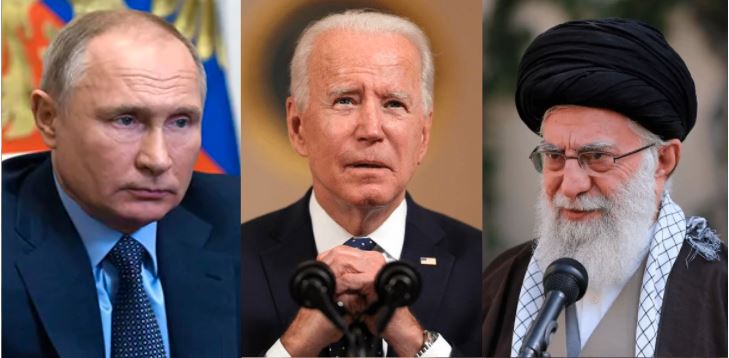If the first few months of Joe Biden’s Presidency has revealed anything, it is the fact that Biden wants to go ahead with the Iran nuclear deal. He will stretch himself to any extent for carrying forward the legacy of his former boss, Barack Obama who had signed the Joint Comprehensive Plan of Action (JCPOA) or the Iran nuclear deal in the first place.
However, there is one man who won’t let the nuclear deal happen. No, we are not talking about Israel’s Prime Minister Benjamin Netanyahu. We are talking about Russian President Vladimir Putin. Iran’s Foreign Minister Mohammad Javad Zarif has made some candid remarks that show Russia’s deep involvement in the negotiation process for a nuclear deal and Moscow’s strategic interests in not letting the deal happen.
Zarif has reportedly disclosed that he was undermined and overruled by his country’s own security forces in negotiating the 2015 nuclear deal. He added that Russia “put all its weight” behind creating obstacles because it was not in Moscow’s interests to let the deal happen.
In the leaked audiotape, Iran’s Foreign Minister accused Major General Qassim Soleimani, the then Commander of IRGC’s elite Quds force, of working with Russia to sabotage the Iran nuclear deal. And then came another big admission from Zarif, when he claimed, “In the Islamic Republic the military field rules.”
So, we have three key takeaways- one, Iran’s military is calling the shots, when it comes to the nuclear deal. The political-military structure in Tehran is such that the civilian establishment runs day-to-day affairs. On the other hand, the security forces report directly to Supreme Leader Ayatollah Ali Khamenei who then takes control of Iran’s military and foreign affairs. Two, the Iranian military is working in tandem with Russia. And finally, Russia doesn’t want the nuclear deal.
Russia has its own reasons for not letting the nuclear deal happen. We know that Russia created obstacles in the 2015 deal by insisting on major concessions like sunsetting a UN ban on conventional arms to Tehran and refusing to go ahead with the prior requirement of certification by the International Atomic Energy Agency (IAEA) that Iran’s past nuclear work wasn’t part of a weapons program.
Trump had to ultimately rescind the 2015 deal because Russia ensured that it was too weak an arrangement. Now, Russia is playing the same trick all over again. Biden wants to expand the Iran nuclear deal and include issues like Tehran’s regional influence and ballistic missiles. But Russia, which is one of the six global powers involved in Iran nuclear deal negotiations, supports only a narrow deal.
And then again, Russia doesn’t want Iran’s regional influence to come up for discussion. After all, Moscow knows that Iran is its gateway into the Middle East region. Also, Iranian militias and proxies are the ones who let Russia exercise influence in conflict zones or disturbed regions like Yemen, Syria and Lebanon.
Zarif has also revealed that former Quds chief Major General Soleimani enjoyed a good relationship with Russia. The fact remains that this was a strategic relationship for Moscow. The Quds force is the foreign-facing arm of Iran’s Islamic Revolutionary Guard Corps (IRGC) and it also trains Iranian militias in the Middle East region.
Moscow has been riding on the influence of Iranian militias in the resource-rich region for quite some time. Iran-backed Houthi rebels in Yemen have been negotiating with Moscow for reopening its Embassy in Sanaa. Similarly, Russia’s military cooperation with Hezbollah in Syria is well-documented. Also, Russia backs Hezbollah’s political role in Lebanon, and the latter helps Russian energy companies outcompete their European counterparts in the conflict-hit nation.
Russia also supports Iran’s proxy in Iraq, Hashd al-Shaabi (or Popular Mobilization Forces). These relationships help Russia exercise economic, diplomatic and military influence in the entire region. At an overall level, Russia’s close cooperation with Iranian militias is an extension of the Russian partnership with top Iranian military commanders, as well as the personal relationship between Putin and Khamenei, which has shown signs of getting even stronger in the recent past.
Within Moscow, there is a sense of understanding about how Iranian militias will continue to spread across the Middle East region, only as long as the conflict between West/ Arabs and Iran continues. The moment they start converging their interests, as far as possible, these militias could start losing their relevance.
For Russia, the Middle East is a better place as long as the Iran-West conflict doesn’t end, so that Moscow can keep riding on the influence of Iranian militias in war-torn countries.
From Tehran’s perspective, cooperation with Russia is an obligation. In order to maintain its bulky military forces and the militias, Iran needs a defence industry to bank upon and Moscow is presently the only power, which can deliver on this front. Russia-Iran military cooperation will therefore have to continue because Tehran has no other option, and Moscow will keep using its influence on the Iranian security forces to not let the nuclear deal happen.








